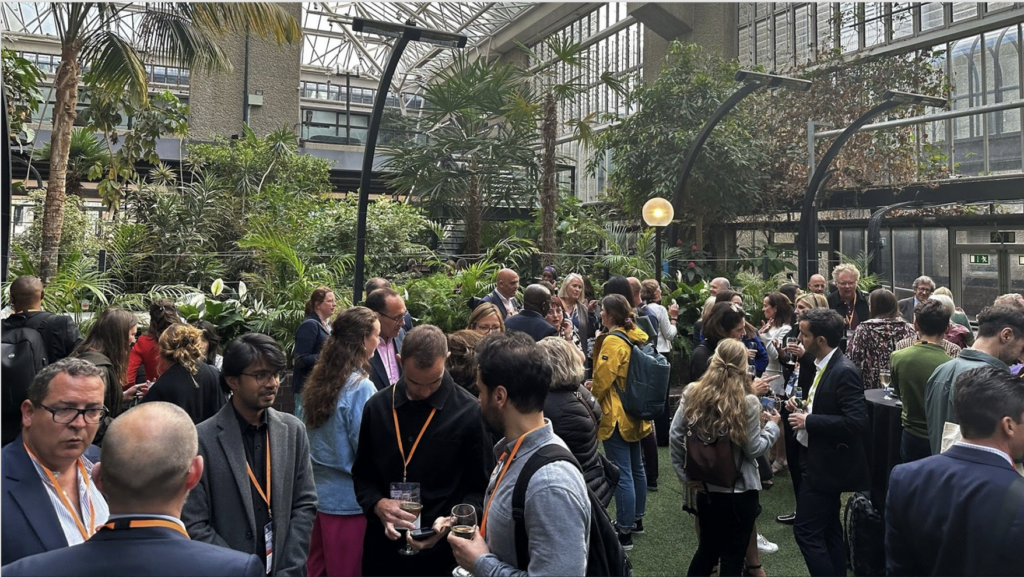
Ecocity 2023 London at the Barbican Centre
First held in 1990, Ecocity World Summit is the pioneer and longest-running global conference on urban ecology and sustainable cities. Every two years it brings together urban stakeholders from across the globe to focus on key actions cities and citizens can take to rebuild our human habitat in balance with living systems.
Ecocity World Summit aims to unite people through a new way of living on the planet that provides the best possible cities while enhancing, not destroying, the biosphere.
Past summits have featured a wide range of leaders and innovators, including Al Gore, former Vice-President of the United States, environmentalists David Brower and Paul Hawken, Apollo 14 astronaut Edgar Mitchell, Martina Otto, United Nations’ Head for Climate and Clean Air Coalition, Jaime Lerner, former Mayor of Curitiba, Brazil, Gavin Newsom, Governor of California, and Denis Hayes, Director of the original National Earth Day.
The next Summit will be hosted by Durban, South Africa in June, 2025.
Past Summits
First held in Berkeley/USA in 1990 as the International Ecocity Conference, the series has been hosted by the following cities:
Berkeley, USA (1990)
Hands-on talent permeated Ecocity 1990. Several testimonials came back from the participants in following years: “Your conference changed my life.” The basic ideas of ecological city design and planning and the very particular means of building, living in and operating such cities were expressed in dozens of ways accessible at many levels. Having great local talent provided a solid foundation and leading speakers from the US and 12 foreign countries made the event representative of the some of the best of what has since become known as “green” and “sustainable” design, technology, lifestyle and even philosophy.
Adelaide, Australia (1992)
Ecocity 1992 was characterized by the passionate desire of our hosts in Adelaide to build a real project — ASAP! Their chief effort was to use the conference to organize action for securing community support for a project for downtown Adelaide, Australia. Years after, they called the project an “urban fractal” – a fraction of the whole city made up of the crucial elements of housing, jobs, commerce, learning, food and public transport, all held together in a design so all parts best complement one another’s roles, just like the whole city is supposed to do — thus a potentially powerful example. The conference produced a declaration calling for cities for people instead of cars and laying out the basic parameters of such a place.
Yoff, Senegal (1996)
This conference on the edge of hot desert and the thundering cold North Atlantic was an adventure deep into another culture and a rare perspective. Many considered it the most exciting conference they had ever attended, thanks in large measure to the generous hospitality of the village of Yoff, near Dakar, which provided foreign conferees with lodging and a fair portion of their fish catch, drumming and dance, and to the hospitality of the city of Dakar, which provided the National Conference Center.
Curitiba, Brazil (2000)
Ecocity 2000 featured explorations of such features in Curitiba as we outsiders could until then only dream about. Twenty-seven blocks of pedestrian streets, dozens of parks and plazas and a transit system co-developed with five arms of high-density residential and commercial development along streets reserved for buses – all these became objects of study and envy. Waterways were restored and open landscapes created to harmlessly inflate, then subside, with storm runoff where formerly hundreds of houses were flooded. Educational programs incorporating ecological lifestyle changes along with basic skills for life in the city were provided in old recycled buses that became classrooms for a community of sparse economic means.
Shenzen, China (2002)
Garden City Shenzhen enthusiastically hosted Ecocity 2002, organized by Rusong Wang, director of the Center for Environmental and Ecological Sciences at the Chinese Academy of Science. Wang subsequently became a member of the People’s Congress of China. Shenzhen had just won a national prize as a garden city for its natural restoration efforts: in strips and patches of natural and agricultural areas, in mangrove forests on the coast and agricultural allotments adjacent and inside its rapidly expanding boundaries.
Bangalore, India (2006)
The capital of high tech, the Silicon Valley of India, busy Bangalore provided Ecocity 2006 with another spotlight illuminating problems and opportunities on ecocity front lines, this time hosted by an NGO called Project Agastya. Bangalore is famously prosperous as the Garden City of India, but equally renowned for frantic, titanic traffic congestion. It’s a city of sprawl of a very different sort, not a suburb but a whole big city, scattered into inefficiency. Large playing fields for soccer, cricket, polo and other games, military marching fields, great government buildings, botanical gardens, small lake-sized reservoirs called “tanks,” temples and shrines, colleges and corporate campuses scatter the city and demand long connecting streets.
San Francisco, USA (2008)
In April 2008, Ecocity Builders brought the conference back to the United States. USA Today ran a national story naming the Ecocity World Summit as one of 7 things to do to “celebrate Earth Day”. Ecocity 2008 focused on how cities and citizens can stop and reverse global climate change, biodiversity collapse, loss of wilderness habitat, agricultural lands and open space, and severe social and environmental injustices. The San Francisco Ecocity Declaration, ratified by the congress, opened with the following preamble: An ecocity is an ecologically healthy city. Into the deep future, the cities in which we live must enable people to thrive in harmony with nature and achieve sustainable development. People oriented, ecocity development requires the comprehensive understanding of complex interactions between environmental, economic, political and socio-cultural factors based on ecological principles. Cities, towns and villages should be designed to enhance the health and quality of life of their inhabitants and maintain the ecosystems on which they depend.
Istanbul, Turkey (2009)
Ecocity 2009 launched with the highest national official yet at any of our conferences. Veysel Eroglu, Minister of Environment and Forestry and head of the governmental body for all issues related to climate change in Turkey, led off with the opening keynote address on his country’s strategy for more sustainable cities and forests. Citing his own country’s participation in the Kyoto Protocol he said: Climate change is the most pressing and complex challenge that humanity faces today. Combating climate change requires strong solidarity of the international society… Turkey is planning to adopt nationally appropriate mitigation planning and no-lose targets to limit emission growth and move to a low-carbon economy. This shift to a low-carbon economy is only possible through technology transfer and multilateral financial support.
Montreal, Canada (2011)
Ecocity 2011 was packed with city officials, planners, activists, educators, and corporations from 75 nations, as well as the United Nations–all trying to plan how the city can be designed and conducted more in harmony with ecosystems, culture and the biosphere. Ecocity Builders and an international advisory committee presented a scheme to assess ecocities on defined standards and indicators. Seeing that international standards for overall sustainability at the city level did not yet exist, they posed how can ecocities take things to the next level and collectively push forward urban sustainability performance across borders, languages, cultures and local conditions?
Nantes, France (2013)
Ecocity 2013 was the first Summit to be held in the European Union. At the international level, the European Commission named Nantes the 2013 European Green Capital. The delegates were impressed with Nantes’ understanding of the need to mold the behavior of individual citizens. During the Ecocity Summit, the “Feeding of the 5,000” offered a culinary protest against food waste with a feast prepared from “ugly” fruits and vegetables that ordinarily are thrown out because of harmless imperfections. In the process of sharing its experiences, Nantes is clearly building its international reputation while pursuing its economic development and eco-tourism strategies.
Abu Dhabi, UAE (2015)
The first Summit to take place in the Middle East, Ecocity 2015’s conference theme revolved around ecocities in areas of resource limitations, especially those imposed by hot and arid climates. Ecocity 2015 aimed to build on UAE’s role as a serious player in sustainable development; support the development of sustainable growth strategies at the city-scale for the region and globally; and create a local, national and regional movement to accelerate sustainable city planning, land use, development, and green buildings.
Melbourne, Australia (2017)
Melbourne’s sustainability credentials were on show to the world with Ecocity 2017 arriving in the city, headlined by Al Gore, Former US Vice President and current Chair of the Climate Reality Project. Leading urban planners, environmental specialists and architects from over 30 countries gathered at the Melbourne Convention and Exhibition Centre to discuss and debate urban ecology and sustainable city initiatives. The city was shining green for their arrival on the evening of 11 July, with iconic Melbourne landmarks such as the Bolte Bridge, the Arts Centre Spire and AAMI Park Stadium lit up in green light to welcome the global goal of equitable cities, while shining a spotlight on the issue of ecologically sustainable cities.
Vancouver, Canada (2019)
Ecocity 2019 helped to build an infrastructure of ideas, strategies, and actions that can be used to promote cities that are socially inclusive and ecologically healthy. The primary theme was “socially just and ecologically sustainability cities.” Important sub-themes included: climate action, circular economy, and informal solutions for sustainable development. The program also used the International Ecocity Standards as a framework to organize the concurrent tracks and sessions for each day of the Summit. The tracks followed the four pillars of: i) urban design, bio-geophysical conditions, iii) socio-cultural features, and iv) ecological imperatives. Within each track, the relevant standards, of which there are 18 in total, framed the session content, informed by the Summit themes.
Rotterdam, The Netherlands (2021)
Ecocity World Summit 2021-22 convened in conjunction with SASBE 2022 – 7th CIB international conference on Smart and Sustainable Built Environments. This edition offered a unique virtual experience for participants around the globe, taking place on 22-24 February 2022, after a postponement due to the global pandemic. Ecocity 2021-22 catered to innovators and pioneers, engineers and planners, policymakers and administrators, professionals and businesspeople, environmentalists and developers, teachers and students, and artists and designers. The conference focused on related themes of healthy and sustainable cities, towns, and villages – from theory and research to the application and implementation of all things related to the ecological city.
London, UK (2023)
If your city is interested in applying to host the Summit, please email info@ecocitybuilders.org and request the latest bid manual.



